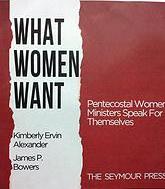What Women Want: Pentecostal Women Ministers Speak For Themselves
 Kimberly Ervin Alexander and James P. Bowers, What Women Want: Pentecostal Women Ministers Speak For Themselves (Lanham, MD: Seymour Press, 2013), 166 pages.
Kimberly Ervin Alexander and James P. Bowers, What Women Want: Pentecostal Women Ministers Speak For Themselves (Lanham, MD: Seymour Press, 2013), 166 pages.
The Church of God (Cleveland, TN) is one of the major Pentecostal bodies in the United States. This book contains the results of a study conducted in that denomination regarding women and ministry. Some books that deal with this subject focus on biblical texts to either support or limit women’s place in ministry, this book, however, asks women ministers what they want. Not surprisingly, what they want is equality in ministry. The Church of God has 3,088 licensed women ministers in the United States, 726 of them participated in this survey (page 29). Those who made up this sample group are from different age groups and ethnic groups (page 13). The respondents come from different parts of the country (pages 30-31) and have varying degrees of education (page 55). One thousand randomly chosen male ministers in the denomination, called Ordained Bishops, were also invited to participate in the study, 16% of them responded (page 34, footnote).
This book is written by two insiders in the Church of God (Cleveland, TN): Kimberly Ervin Alexander and James P. Bowers. Both of these individuals are people of high academic credentials; they both have Ph.Ds. Alexander is a historical theologian who has in the past served as an assistant vice president for a seminary and is also a past president of the Society for Pentecostal Studies (page 12). Bowers has served as a pastor and seminary vice president (page 12).
The main body of the text consists of seven chapters. The chapters are: Hearing Their Voices, What They Believe About Family, How Power and Leadership Function, Are Women Flourishing as Ministers?, What Women Can Expect in Compensation and Advancement, What A Pentecostal Woman Minister Looks Like, and Looking from the Outside by Cynthia Wooleever. Chapters 2, 3, 4, and 5 each contain two responses to the material presented in the chapter from women ministers in the Church of God. The book also contains three appendixes. The study contained in this book is very detailed; there are a lot of facts and figures some of which are presented in graph and chart form as well.
The fact that the Church of God has 3,088 licensed women ministers in the United States may at first seem to be a very encouraging sign, and in some ways it is. At least the church recognizes that women have God-given ministries and acknowledges these ministries by giving the women ministerial recognition in the form of credentials. However, a closer look shows that these women are definitely not equal with men in ministry. For example, women are “for the most part” not allowed to serve in “state or national positions of authority in the USA” (page 13). In addition, even though they are credentialed ministers they are not allowed to vote in the General Council of the General Assembly (page 13). This means that they do not have a voice in the policies adopted by their denomination. There are also other areas in which they are clearly at a disadvantage; these areas include financial compensation and opportunities for advancement.


